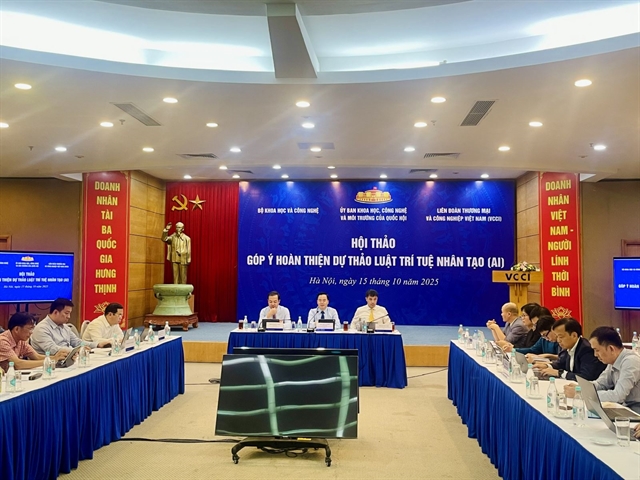 Economy
Economy


|
| The overview of the seminar. — Photo baotintuc.vn |
HÀ NỘI — A workshop to gather feedback on the draft law on artificial intelligence (AI) took place in Hà Nội on Wednesday, attracting numerous experts, scholars, lawyers, journalists, and representatives from the business community.
The event was co-organised by the Vietnam Chamber of Commerce and Industry (VCCI), the National Assembly (NA)’s Committee on Science, Technology and Environment, and the Ministry of Science and Technology,
Opening the workshop, Trần Văn Khải, deputy head of the NA committee, noted that AI has been identified as one of Việt Nam’s national priority technologies, playing a key role in digital transformation and the knowledge-based economy. Việt Nam aims to become one of the leading countries in Southeast Asia in AI research and development.
The rapid AI development poses many legal, moral, and safety challenges, requiring an appropriate legal corridor. Given this, an AI law is of critical importance to creating a legal cornerstone for promoting AI research, development, and governance in a safe and responsible manner, he went on.
The draft AI law has been developed on the principle of sustainable, transparent, and responsible development, Khải said.
In his co-opening remarks, Đậu Anh Tuấn, VCCI Vice Secretary-General and Director of the Legal Affairs Department, said the business community highly values the scientific and open-minded approach taken in drafting the law despite the short preparation time. Many of its key aspects are aligned with international standards, such as risk-based management, controlled testing mechanisms, human rights, and ethical safeguards.
Tuấn expressed hope that the draft will ensure flexibility and adaptability to avoid rigidity that could hinder innovation. He also called for simplifying administrative procedures, streamlining registration and disclosure processes, and strengthening investment in data infrastructure and computing capacity to reduce dependence on external systems.
In addition, he highlighted the importance of clearly defining legal liability, insurance mechanisms, and risk-sharing frameworks while drawing on international experience yet maintaining Việt Nam’s distinct regulatory characteristics.
From a technical perspective, Trần Vũ Hà Minh, chief advisor for responsible AI at FPT Software, shared that a recent survey by the National Institute for Digital Technologies and Digital Transformation identified data – the foundational element of all AI systems – as one of the major bottlenecks in Việt Nam’s current AI development.
Minh recommended that as it is still in the early stages of building and applying AI, the country has a unique opportunity to design its AI systems with strong governance and compliance standards from the outset.
She further suggested the need for guidelines on responsible digital transformation, ensuring compliance with ethical and technical standards from the initial implementation stages. For high-risk or key AI projects, detailed policies, regulations, and technical standards should be established so that businesses can confidently move forward without concerns about legal or technical barriers.
The most important is to provide training for and improve AI-related awareness from grassroots to high-level leaders, equip SMEs with necessary knowledge, and organise in-depth refresher courses for senior managers, data engineers, and technology legal experts, she added. — VNS